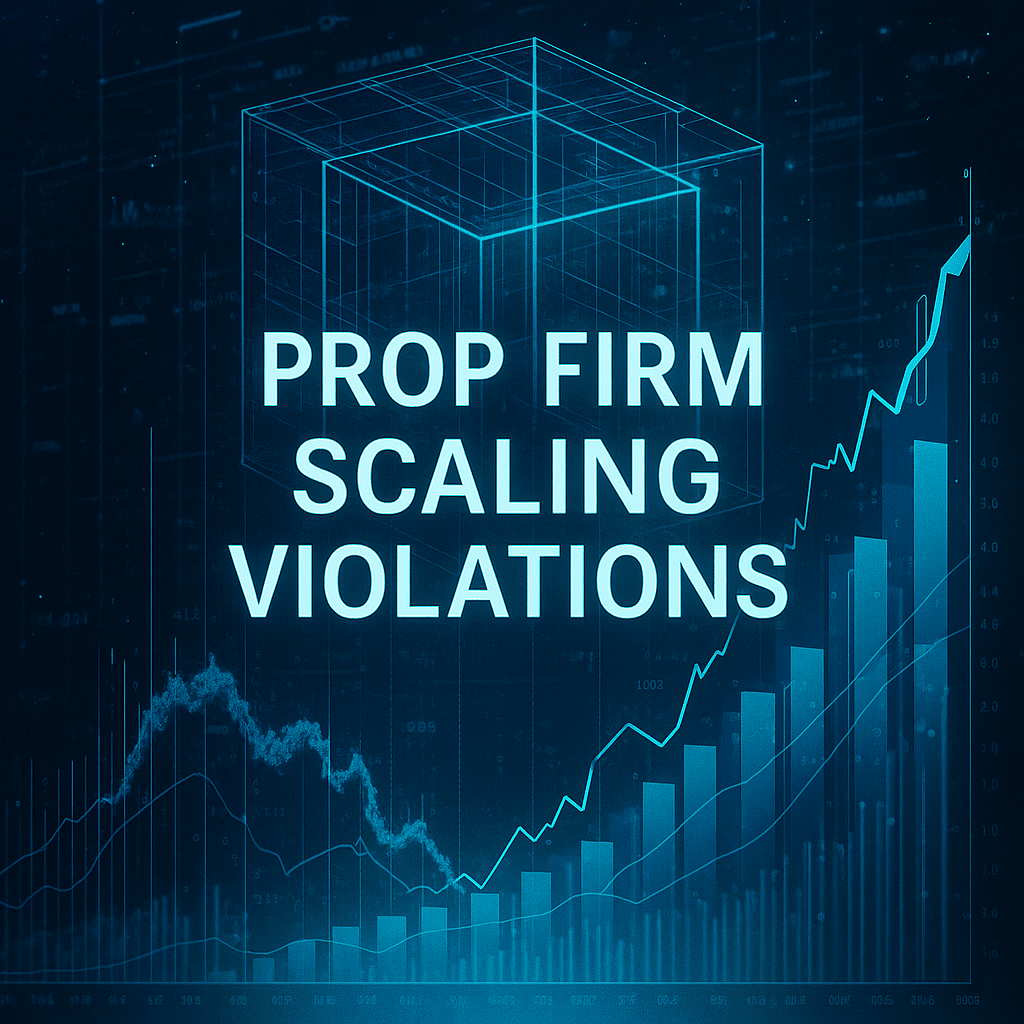Introduction: Why Prop Firm Scaling Violations Matter
Prop firm scaling violations are more common than many traders realize. These rules exist to manage risk and reward consistent performance. While some traders view them as limitations, they actually serve as guardrails for steady growth. Breaking scaling rules, whether by mistake or on purpose, can lead to serious consequences that affect your funding journey.
What Are Scaling Rules in Funded Trading?
Scaling rules define how and when a trader can increase their capital or position sizes. These rules aim to reward consistent traders while protecting firms from unnecessary risk. For example, many firms allow scaling only after achieving steady profits over a specific time frame.
Typically, scaling depends on:
-
Percentage return over a set period
-
Risk management metrics (e.g., drawdowns)
-
Number of trading days or volume
-
Lot size limits
The scaling process isn’t random. It is designed to encourage discipline and prevent traders from taking large risks immediately after getting funded.
Common Types of Prop Firm Scaling Violations
Violating scaling rules can happen in several ways. Some of the most common include:
-
Oversizing positions: Opening trades that exceed your current capital allowance.
-
Aggressive behavior post-scale-up: Rapidly increasing lot sizes right after a scale-up without maintaining consistency.
-
Skipping the consistency phase: Trying to jump ahead without proving reliability.
-
Doubling down after small wins: Increasing risk exposure impulsively after a few good trades.
Each of these actions can trigger alerts within the firm’s risk systems. In most cases, they indicate that the trader is chasing short-term profits instead of following the rules.
What Happens When You Break Scaling Rules?
Let’s explore the typical outcomes when a trader breaks the scaling rules:
1. Initial Warning or Notification
In some cases, prop firms may notify traders when a minor scaling rule violation is detected. This gives the trader an opportunity to review their actions and make adjustments before stricter measures are considered.
2. Temporary Restrictions
If the violation is more serious or repeated, trading may be temporarily restricted. You might lose access to scaling privileges until a review is completed. This ensures that traders don’t continue breaking rules without consequence.
3. Profit Disqualification
Some firms disqualify profits earned during the violation period. While this may sound harsh, it reinforces the importance of following the agreed-upon structure.
4. Account Termination
In the worst-case scenario, continuous or major violations lead to permanent account closure. Firms take this step to protect capital and maintain fairness across all traders.
Why These Rules Exist in the First Place
Scaling rules are not there to punish traders. Instead, they serve several critical functions:
-
Protect firm capital from overexposure
-
Encourage consistency instead of risky behavior
-
Ensure fairness across all funded traders
-
Reinforce discipline as a core trait of successful trading
Without clear boundaries, traders may rely on luck or emotion, which goes against the long-term objectives of proprietary trading.
How to Avoid Prop Firm Scaling Violations
Thankfully, avoiding violations is straightforward if you follow these best practices:
1. Know Your Limits
Always understand your current trading tier. Track your allowed lot size, risk limits, and any conditions tied to scaling up.
2. Wait for Confirmation
Even if you feel ready to increase your exposure, wait until the firm officially confirms your scale-up. Never assume you’re eligible based on profit alone.
3. Focus on Consistency
Firms reward traders who remain consistent across different market conditions. Avoid the temptation to jump to higher risk after a winning streak.
4. Ask Questions
If you’re unsure about a rule or feel stuck, reach out to support. It’s better to confirm than to risk violating the terms.
How Larsa Capital Supports Your Growth
At Larsa Capital, we believe in rewarding long-term discipline. Our scaling policy is transparent, and we communicate clearly when you’re eligible for capital increases. Moreover, we offer support to guide you through every phase of your journey.
If you ever face uncertainty about your account limits or next steps, don’t hesitate to reach out. We’re here to help you grow the right way.
Final Thoughts
Scaling rules may seem restrictive at first, but they serve a vital role in building your long-term trading success. Breaking them leads to real consequences—both financially and operationally. Instead of taking shortcuts, aim to master consistency. That’s how you earn trust, grow your capital, and thrive in the world of proprietary trading.
In short, avoiding prop firm scaling violations is not just about rule-following—it’s about becoming a professional trader who earns every step forward.

